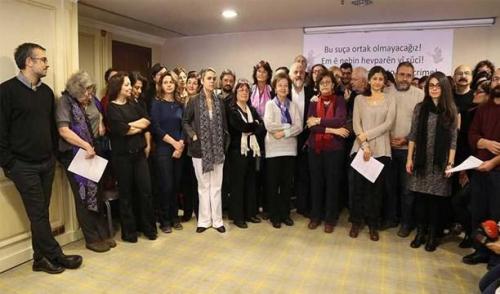Turkey: Academics Jailed For Signing Petition
Hundreds Investigated for ‘Terrorism’
In the latest attack on free speech in Turkey, three academics who signed a peace petition in January 2016 have been jailed by an Istanbul court on suspicion of “making terrorist propaganda.” The three were jailed on March 15, 2016, pending the completion of a criminal investigation.

The Academics for Peace petition signed by 1128 academics was read out at a press conference in Istanbul on January 11, 2016.
At least 30 other academics have been dismissed and 27 suspended by their universities pending investigation. The Istanbul prosecutor responsible for terrorism crimes is conducting a criminal investigation into all the academics who signed the petition and many local investigations are taking place.
“President Erdogan’s vicious campaign against the academics is part of his drive to banish, punish, and silence all critical voices in Turkey,” said Emma Sinclair-Webb, senior Turkey researcher at Human Rights Watch. “Turkey’s universities, prosecutors, and courts should respect and protect free speech and the rule of law by immediately dropping all investigations and punitive measures against all those who signed the declaration.”
The petition at issue, initially signed by 1,128 academics calling themselves Academics for Peace and then by more than 1,000 others, declared “We will not be party to this crime.” They condemned the Turkish government’s security operations against the armed Kurdistan Workers’ Party (PKK) youth movement in cities of southeast Turkey because of the disastrous impact on the Kurdish civilian population. Made public at an Istanbul news conference on January 11, the petition also called for a resumption of peace talks with the PKK.
In response, President Recep Tayyip Erdoğan unleashed a harsh campaign vilifying the academics in at least five speeches – terming them vile, equal to terrorists, base and dark – and demanding sanctions against them. Human Rights Watch spoke to 12 petition signatories about the criminal and disciplinary investigations against them, the threats they received, and their suspensions and dismissals.
The three academics placed in pretrial detention are Muzaffer Kaya, Esra Mungan and Kıvanç Ersoy on March 16. Ersoy teaches in the mathematics department at Mimar Sinan University and Mungan in the psychology department at Boğaziçi University. Kaya was recently dismissed from the social work department at Nişantaşı University for signing the petition. They were detained and then jailed by a court a day after Erdoğan called for the crime of terrorism to be widened to include expression which he judges “serves the aims of terrorists,” and which would target professions such as journalists, politicians and activists. His remarks came after the March 13 bombing which killed 37 people in Ankara’s city center.
“The three jailed academics have committed no crime and should be immediately released,” said Sinclair-Webb. “Imprisoning advocates for peace who have criticized government policy not only flouts international standards, but will do nothing to prevent terrorism or bring justice for the victims of the Ankara bombing.”
Universities should also promptly reinstate the academics who have been dismissed or suspended pending investigation, and prosecutors should ensure that the courts promptly lift overseas travel bans they have imposed on six of the signatories, Human Rights Watch said.
Over the past two months, police have detained around 15 academics for short periods and in some cases searched academics’ homes and offices. An Istanbul prosecutor is conducting a criminal investigation into all signatories on suspicion that they “made terrorism propaganda” and “insulted the Turkish nation or state institutions,” and there are many ongoing investigations opened by prosecutors throughout the country. The Council of Higher Education, which oversees Turkey’s higher education system, pushed universities to investigate those who signed the petition.
The legal basis for suspending academics is not clear in university regulations, and universities have in many cases not provided grounds for the suspensions and dismissals. All the academics Human Rights Watch spoke to described being questioned by prosecutors about their political views, a line of inquiry completely unrelated to exercising their legitimate right to free speech by signing the petition.
Source: Human Rights Watch
- 283 reads
Human Rights
Ringing FOWPAL’s Peace Bell for the World:Nobel Peace Prize Laureates’ Visions and Actions

Protecting the World’s Cultural Diversity for a Sustainable Future

The Peace Bell Resonates at the 27th Eurasian Economic Summit

Declaration of World Day of the Power of Hope Endorsed by People in 158 Nations

Puppet Show I International Friendship Day 2020

